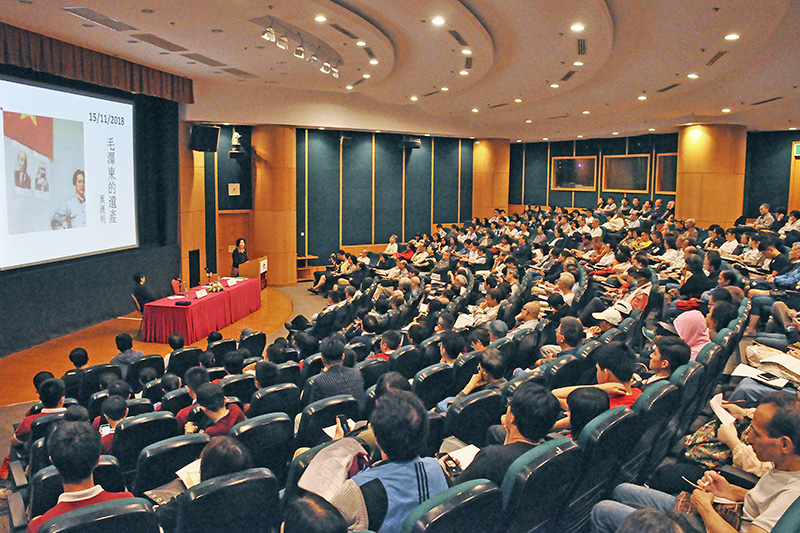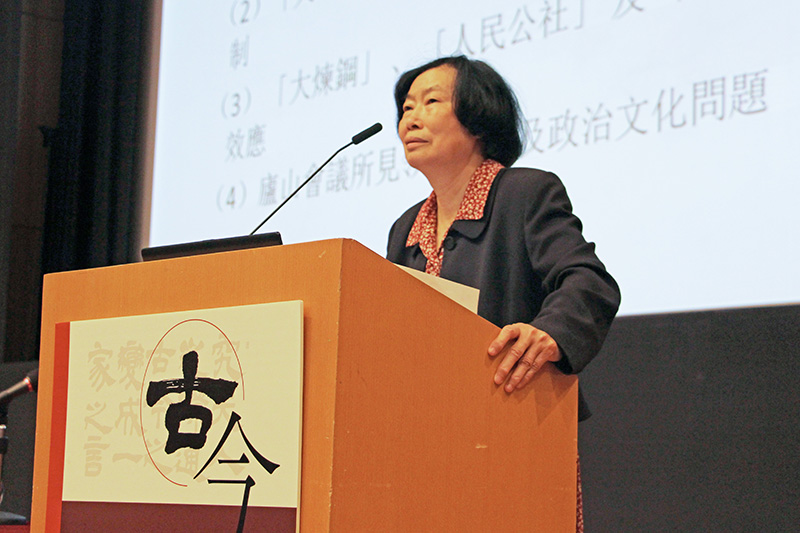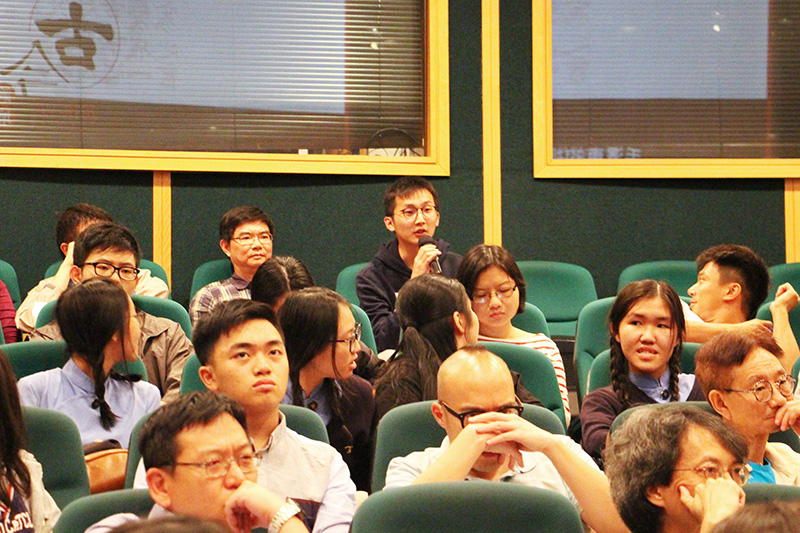Department News
Congratulations to the graduates of the 2017–18 MA Programme in Comparative and Public History! Recapping the group photo-taking session held at the Lady Shaw Building Rooftop Garden on 16 November 2018. Prof. LAI Ming Chiu, Chairman of the Department, was invited to present the Scholarship for Outstanding History MA Students awards to Miss CAO Huiyi and Miss ZHU Gehui. Furthermore, the 2017–18 MACPH Graduation Dinner and Alumni Banquet was held on 17 November 2018, attended by more than 70 students, alumni and teachers. The Ko Kam Lun Memorial Scholarship awards were presented to students as encouragement for their pursuit of academic excellence.

Personalia
Acting Appointment
Prof. LAI Ming Chiu, Chairman, will be on academic leave from 29 November to 3 December 2018. During his absence, Prof. CHEUNG Sui Wai will serve as the Acting Chairman.
Academic Activities
Recapping the Public Lectures on History 2018–19 delivered by Prof. YIP Hon Ming on 15 November 2018
Prof. YIP Hon Ming, Adjunct Professor of the Department of History, CUHK, was invited by the Department as the guest speaker of the second lecture of “Public Lectures on History 2018–19”. The second lecture, entitled “The Legacy of Mao Zedong” was held on 15 November 2018 at Hong Kong Central Library. Prof. HO Pui Yin, Vice Chair of the Department, served as the moderator. The lecture attracted a full house of some 300 people.
The talk centered around the legacy left by Mao Zedong, particularly on historical revelations from the Great Leap Forward and the Cultural Revolution. Prof. YIP traced the previous political slogans initiated by Mao Zedong during the Great Leap Forward and the Cultural Revolution through historical newspapers. She pointed out that the unique political culture of Mao’s era, namely the focus on spiritual mobilisation, the importance of ideology to politics and class struggles in order to promote the socialisation of the Cultural Revolution, which eventually led to highly centralised powers. Chronic problems of such a system were manifested in the loss of oversight of powers, replacement of the rule of law by the rule of man, and life tenure of office. Having seen those problems, Deng Xiaoping implemented a series of institutional reforms, which included the abolition of life tenure after the Cultural Revolution, emphasis on democracy within the Communist Party, promotion of the rule of law, and proposal for socialist democracy. Today, can the problems of such a system be solved? How do we discuss them? Can they still be discussed? Prof. YIP’s lecture received warm responses during the question and answer session.
Recapping the “Workshops for the Final-Year RPg Students 2018-19” held on 16 November 2018
The Division of History organised the “Workshops for the Final-Year RPg Students”, offering an interactive sharing and exchange platform for the Department’s research postgraduate students to exchange and discuss their research findings.
Recapping the Academic Seminar “當直接統治遭遇邊疆風俗:18到19世紀湖南新闢苗區與改土歸流區的比較研究” conducted by Dr. XIE Xiaohui on 16 November 2018
Dr. XIE Xiaohui of the Department of History, Sun Yat-sen University, was invited by the Department to present a lecture to the Department’s postgraduate students.
Dr. XIE compared the different historical developments of south-west Hunan versus north-western parts of Hunan in the Qing Dynasty from the 18th to the 19th centuries. Unlike north-west Hunan, which had been under the rule of the tusi chieftain, the social structure of the Miao society in south-west Hunan seemed to lack a distinct socio-political hierarchy, and was more ritual-based guided by Miao people’s own worldview. In the eyes of Qing dynasty officials, Miao people’s customs appeared barbaric. When Qing officials tried to govern the place with the Qing code, they inadvertently disrupted Miao people’s existing dispute resolution mechanisms and created even more problems. In the end, the government decided to govern Miao people with Miao rules and adopted flexible governance strategies on issues such as household registration and taxation. Such ruling strategy allowed the Miao society to retain the characteristics of “frontier township” that were different from the north-west and has influenced the threads of social history since then.
Upcoming Events
Academic Seminar
| Date : | 27 November 2018 (Tuesday) |
| Time : | 4:30pm–6:00pm |
| Venue : | Room 101, 1/F, Fung King Hey Building, CUHK |
| Topic : | Sheng Xuanhuai Archive: A Digital Collection for Research and Experiment |
| Speaker : | Mr. Jeff LIU Digital Services Librarian, CUHK Library |
| Language : | English & Cantonese |
| Enquiry : | 3943 8541 |
Academic Writing Workshop
| Date : | 29 November 2018 (Thursday) |
| Time : | 4:30pm–6:00pm |
| Venue : | Room 101, 1/F, Fung King Hey Building, CUHK |
| Topic : | 撰稿基本功:如何運用自心? |
| Speaker : | Ms. CHEUNG Man Yan Journalist |
| Language : | Cantonese |
| Enquiry : | 3943 8659 |
Academic Seminar
| Date : | 10 December 2018 (Monday) |
| Time : | 4:30pm–6:00pm |
| Venue : | Room 101, 1/F, Fung King Hey Building, CUHK |
| Topic : | 從學以為己到事事關心 |
| Speaker : | Prof. Thomas LEE Hong Chi Chair Professor Emeritus, National Tsing-hua University Professor Emeritus, The City College of New York |
| Language : | Putonghua |
| Enquiry : | 3943 8541 |
Call for Articles – MA Programme in Comparative and Public History
The MA Programme in Comparative and Public History now calls for articles. All undergraduates and postgraduate students of the Department of History are welcome to submit articles. Articles, with a length of between 1,000 and 2,000 words, can be written in English or Chinese. Any aspects relating to campus life, anecdotes concerning studies and historical subject matters are acceptable, with photo attachments required.
All submitted articles will be reviewed by the MA Programme. The Programme reserves the right to make any changes deemed necessary. Accepted articles will be published on social media platforms of the MA Programme and authors will be remunerated.
The Programme welcomes submissions of articles throughout the year. For enquiries, please email to macph@cuhk.edu.hk or contact Miss Sharon Wong at 3943 8659.
For teachers and students who have information to share with the Department,
please email your articles in both Chinese and English to chanfiona@cuhk.edu.hk by 4:00pm every Tuesday.





























